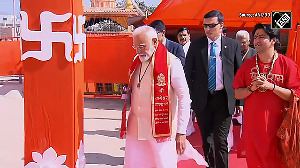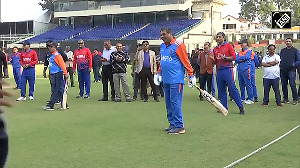Gangmen -- these are the posts over which Biharis and people from Uttar Pradesh are facing persecution in Assam and Mumbai.
Shiv Sena workers even beat up candidates who came from these two states to Mumbai to take the Railway Recruitment Board's examination for the post.
But what is it that gangmen do?
 Gangmen, who are class IV government employees, work in two shifts of eight hours each. During this period they are constantly on their feet maintaining tracks and fishplates and generally making sure that everything is in perfect condition.
Gangmen, who are class IV government employees, work in two shifts of eight hours each. During this period they are constantly on their feet maintaining tracks and fishplates and generally making sure that everything is in perfect condition.
Their career chart goes something like this: gangmen, keymen, mate (leader of a small group), rail mistry and inspector.
Anil Damodar Dalvi, 44, joined the Indian Railways in 1976. During those days no educational qualification was required for the job; physical strength was the only criteria.
"I am not satisfied with this job," Dalvi, who get a net monthly of Rs 3,510, says. "I have to do very hard and tough work. But my needs force me to be here."
And his needs, or at least those of his family, are high. He has two children -- a son in college and a daughter in school.
Mahavir Musai, 45, who joined the railways in 1978, has even more commitments: three daughters, of whom one is married and two are in school.
He shows his palms and says, "Look, completely calloused. I don't want to do this work, but there is no choice."
Gangmen are entitled to government accommodation. They also get two pairs of uniform -- orange t-shirts and khaki pants -- every year. Every three years they get a woollen blanket and raincoat.
They also have group insurance, for which they pay Rs 15 to 30 every month. In case of any accident, they get Rs 15,000 to 30,000 from group insurance and more than Rs 100,000 from individual insurance policy.






 © 2025
© 2025